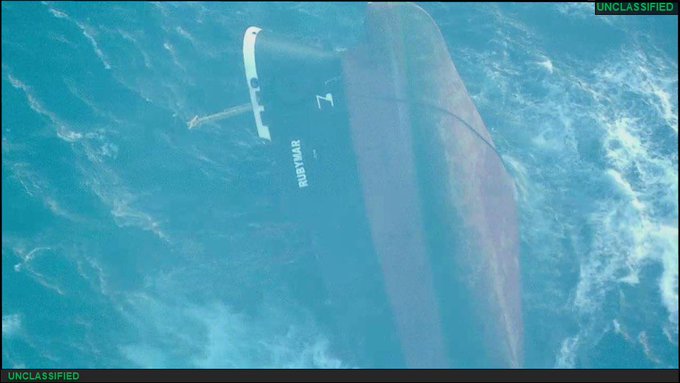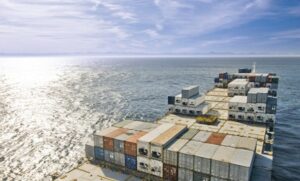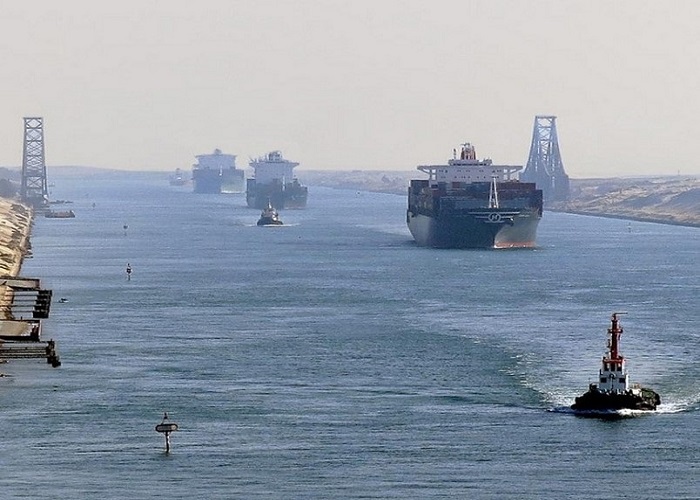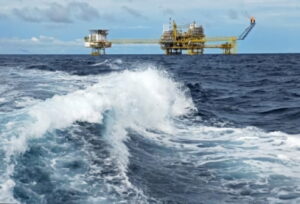Sunken Rubymar presents ‘imminent danger’ to marine ecosystems
A Belize-flagged, UK-owned bulk carrier that sank in the Red Sea on March 2 after a missile attack is said to present an environmental risk that requires urgent action.

The 32,200 dwt Rubymar was attacked by Houthi rebels while transiting the Strait of Bab el-Mandeb, about 35 NM south of Al Mokha, Yemen, on February 18, 2024.
The ship sustained significant damages and had been slowly taking on water. Reports indicate that the bulker had been leaking oil for sever days after the attack. The crew members were safely evacuated.
“The approximately 21,000 metric tons of ammonium phosphate sulfate fertilizer that the vessel was carrying presents an environmental risk in the Red Sea. As the ship sinks it also presents a subsurface impact risk to other ships transiting the busy shipping lanes of the waterway,” the United States Central Command (CENTCOM) said in a statement.
In a separate statement, the International Maritime Organization (IMO) said it is working with partners to provide assistance to the Government of Yemen following the recent sinking of the vessel Rubymar in the Red Sea area.
“The recent sinking of the vessel Rubymar represents an additional risk for the environment and maritime security. We are in contact with the Government of Yemen and other UN organizations to provide necessary assistance,” Arsenio Dominguez, Secretary-General of the IMO, said on March 4.
Greenpeace MENA: Immediate action needed to avert an environmental catastrophe in the Red Sea
Greenpeace Middle East and North Africa (MENA), a non-profit independent organization, has called for urgent action in response to the sinking of the cargo ship Rubymar.
Believed to be carrying over 41,000 tonnes of ammonium nitrate fertilizer the Rubymar wreckage “presents an imminent danger to the delicate marine ecosystems in the area”.
“Without immediate action, this situation could escalate into a major environmental crisis. As well as any further leaks of fuel oil from the engines, the sinking of the vessel could further breach the hull, allowing water to contact with the thousands of tonnes of fertilizer, which could then be released into the Red Sea and disrupt the balance of the marine ecosystems, triggering cascading effects throughout the food web,” Julien Jreissati, Programme Director at Greenpeace MENA, pointed out.
“This disruption could have far-reaching consequences, affecting various species that depend on these ecosystems and, in turn, potentially impacting the very livelihoods of coastal communities. Immediate access to the shipwreck site is imperative for an expert response team to assess the situation and swiftly devise and implement an emergency plan.”
First sinking of a ship since tensions escalated
Since last year, the Red Sea has become the major epicenter of heightened tensions as Yemen’s Houthi group increased attacks on commercial ships linked to Israel, the US and the UK.
However, Rubymar is said to be the first vessel lost since the attacks started in November 2023.
Related Article
-
Navigating the new normal: Vessel rerouting spurs higher emissions as ships avoid the Red Sea
Business Developments & Projects
Many small and big shipping companies have been avoiding the Red Sea due to safety concerns. Seeking alternative routes has translated into longer cargo travel distances, rising trade costs and insurance premiums. Furthermore, greenhouse gas (GHG) emissions are also growing from having to travel greater distances and at greater speed to compensate for the detours.
Related Article
Houthi forces are targeting commercial ships linked to Israel as the movement demands humanitarian aid be delivered to Gaza and seeks a cease-fire in the Strip.
Mohammed Ali al-Houthi, Head of Yemen’s Houthi supreme revolutionary committee, said on Twitter that Rishi Sunak, UK’s Prime Minister and ‘his government’ should be held responsible for the Rubymar loss as they openly support ‘genocide’ in Gaza.
He added that Sunak has a chance to recover Rubymar by signing a letter of guarantee to allow aid trucks into Gaza.
READ MORE
- Red Sea crisis escalation: US-UK airstrikes, Houthis’ vessel attacks, spike in oil prices, and tanker trade slowdown
- IMO’s decarbonization focus tested amid escalating Red Sea tensions
- Eagle’s bulker hit by ‘projectile’, crew uninjured as Red Sea situation continues to escalate
- Maersk’s security team fires back on Houthi in Red Sea, thwarts boarding, prompting another operational pause








